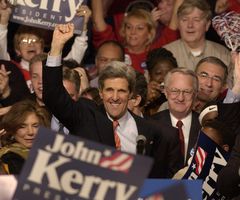Politics and history work in mysterious ways.
![Learn how caucuses work in under a minute [video : 79309240]](http://videos.usatoday.net/Brightcove2/29906170001/2016/01/29906170001_4721027562001_video-still-for-video-4720993135001.jpg?pubId=29906170001)
Take the Iowa caucuses, for example.
Come Monday night, residents of Iowa will cast the very first votes of the 2016 presidential election — a power bequeathed them by a Democratic delegate rules fight from the 1960s and the ambitions of an up-and-coming politician named Jimmy Carter in 1976.
"He really created the transformative moment," said Julian Zelizer, a biographer of the man who pioneered the Iowa caucuses and became the nation's 39th president.
![Iowa Caucuses History | DesMoinesRegister.com [oembed : 79515580] [oembed : 79515580] [oembed : 79515580] [oembed : 79515580] [oembed : 79515580] [oembed : 79515580] [oembed : 79515580] [oembed : 79515580] [oembed : 79515580] [oembed : 79515580]](/Portals/_default/Skins/PrestoLegacy/CommonCss/images/smartembed.png)
Iowa's primacy in the political firmament rankles some residents in the other 49 states. Still, it's doubtful to change anytime soon, as the political parties, the media, and the presidential candidates themselves combine to make the Iowa caucuses a heartland institution.
In some ways, the influence of the Iowa caucuses stems from the tumultuous 1968 Democratic convention in Chicago. Critics protested the way Democratic power brokers controlled the nomination process, including the selection of convention delegates.
![AP DEMOCRATS CHICAGO A $C FILE USA IL [image : 79462524]](http://www.gannett-cdn.com/media/2016/01/28/USATODAY/USATODAY/635895820264314659-AP-DEMOCRATS-CHICAGO.jpg)
The party responded with new rules on picking delegates, changes that basically forced Iowa to change the calendar of a caucus system it had used since the mid-19th century.
When Iowa Democrats moved up their 1972 caucuses to January, candidate and future Democratic nominee George McGovern — who had been involved in the rule changes — traveled to the Hawkeye State to campaign.
McGovern's exertions drew the attention of aides to the then-little-known governor of Georgia: Jimmy Carter.
After announcing his long-shot presidential bid in late 1974, Carter began racing across Iowa, recruiting volunteers, appearing on local and radio television states, and creating staged events that began to draw media coverage — basically the same thing that happens today.
![USA TODAY's 2016 Presidential Poll Tracker [oembed : 79462876] [oembed : 79462876] [oembed : 79462876] [oembed : 79462876] [oembed : 79462876] [oembed : 79462876] [oembed : 79462876] [oembed : 79462876] [oembed : 79462876] [oembed : 79462876] [oembed : 79462876] [oembed : 79462876] [oembed : 79462876] [oembed : 79462876]](/Portals/_default/Skins/PrestoLegacy/CommonCss/images/smartembed.png)
![Iowa Caucuses | The Des Moines Register | DesMoinesRegister.com [oembed : 79462764] [oembed : 79462764] [oembed : 79462764] [oembed : 79462764] [oembed : 79462764] [oembed : 79462764] [oembed : 79462764] [oembed : 79462764] [oembed : 79462764] [oembed : 79462764] [oembed : 79462764] [oembed : 79462764] [oembed : 79462764] [oembed : 79462764]](/Portals/_default/Skins/PrestoLegacy/CommonCss/images/smartembed.png)
It was Carter who made the Iowa caucuses "a substantive, multi-media event," Zelizer said.
Carter won Iowa in 1976 — sort of. He finished ahead of other Democratic candidates, but behind an "uncommitted" slate of delegates. Still, the attention lavished on Carter helped propel him to the presidency and inspired succeeding candidates, including Barack Obama in 2008.
Carter also served as a model for Republican candidates.
In 1980, former congressman, diplomat, and CIA director George H.W. Bush upset prohibitive favorite Ronald Reagan in Iowa, a win that made Bush a major player in that race and helped lead to his selection as Reagan's running mate. (A political parlor question: Where would the Bush family be today if H.W. Bush had not taken Iowa in 1980?)
By that time, Iowa was on par with New Hampshire's "first-in-the-nation" primary — and began taking some criticism from voters in other states. According to a Morning Consult poll released this week, 50% of voters said they would support reducing the influence of Iowa and New Hampshire in the presidential nominating process.
![Election flashback quizzes: 8 ways to distract yourself from the 2016 race [oembed : 79515838] [oembed : 79515838] [oembed : 79515838] [oembed : 79515838] [oembed : 79515838] [oembed : 79515838] [oembed : 79515838] [oembed : 79515838] [oembed : 79515838] [oembed : 79515838]](/Portals/_default/Skins/PrestoLegacy/CommonCss/images/smartembed.png)
Iowa residents, meanwhile, said they like the arrangement.
As with their counterparts in New Hampshire, voters in Iowa said their state is small enough for candidates to get around and see a lot of people. The voters, in turn, get to see a lot of the candidates and take the process seriously.
"People who go to the caucuses have really done some homework," said Molly Tedesco, 72, a substitute teacher from Johnston who showed up on a snowy night to catch a Marco Rubio town hall.
The concentration on one state gives lesser-known, lesser-funded candidates a chance to emerge, just as Carter did in Iowa in 1976, voters said.
![AP DEMOCRATS KERRY A ELN USA IA [image : 79462652]](http://www.gannett-cdn.com/media/2016/01/28/USATODAY/USATODAY/635895821869273523-A01-KERRY-20.jpg)
John Kerry rallied past Howard Dean in the 2004 Democratic caucuses and went on to capture the party's presidential nomination that year. Obama speaks fondly of Iowa for launching his successful presidential campaign in 2008.
Bob Dole emerged as a major presidential candidate after winning the Republican caucuses in 1988. George W. Bush's caucus win in 2000 launched his ultimately successful campaign.
Amy LeWarne, 52, a registered hospice nurse who attended a Donald Trump event in a high school gym in Marshalltown, said the Iowa caucuses have become a tradition by now, 40 years after Carter put them on the political map.
LeWarne also noted she used to live in Oklahoma and never saw presidential candidates.
"Somebody's got to go first," she said, "and I'm rather enjoying it."
![88 photos: Iowa Caucus historical images 1972-2012 [gallery : 17925573]](http://www.gannett-cdn.com/-mm-/44490a6c704ba1b1eb5e04ef256b6c04daabd8a7/c=0-113-437-487/local/-/media/IAGroup/None/2014/10/25/635498667588636151-ic01.jpg)


![JIMMY.CARTER.1976.USA.TODAY A ELN USA IA [image : 79449198]](http://www.gannett-cdn.com/-mm-/8665138e577ca3ffa5f8bc34c62d65943bfc13d7/c=657-0-2014-1160/local/-/media/2016/01/28/USATODAY/USATODAY/635895622728323963-AXX-IOWA-CHART-CARTER-277029.JPG)
